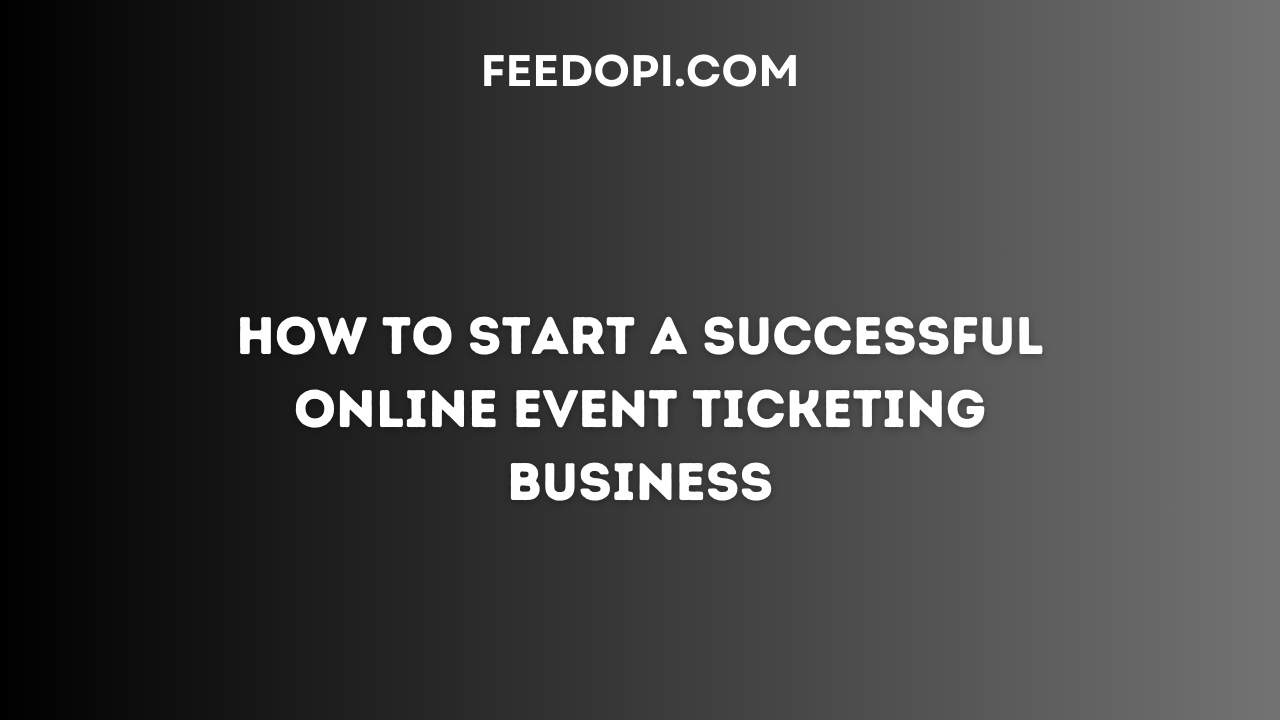Starting an online event ticketing business can be a lucrative venture, especially in today’s world where live events, conferences, concerts, and sports events continue to draw large crowds. To successfully establish your online event ticketing platform, follow these steps:
H1: Market Research and Planning
H2: Identify Your Niche and Target Audience
Determine your focus within the event ticketing industry. Are you targeting a specific type of event (e.g., music festivals, sports events, theater shows) or catering to a particular geographic area? Understanding your niche and target audience is crucial.
H2: Competitor Analysis
Research existing online event ticketing platforms to understand their strengths and weaknesses. Identify gaps in the market that you can exploit or areas where you can offer a superior experience to customers.
H2: Business Plan
Create a detailed business plan that outlines your goals, financial projections, marketing strategies, and a timeline for your ticketing business. This plan will serve as your roadmap for the future.
H1: Legal and Financial Setup
H2: Business Registration
Register your business and obtain any necessary licenses or permits to operate as an online event ticketing platform in your region. Consult with legal professionals to ensure compliance with local regulations.
H2: Payment Processing
Set up a secure and reliable payment processing system. Work with payment gateway providers to handle transactions and ensure that your customers can make secure purchases.
H2: Pricing Structure
Determine your pricing structure. Consider whether you’ll charge a flat fee, a percentage of ticket sales, or a combination of both. Be competitive while ensuring your business remains profitable.
H1: Building Your Online Platform
H2: Website Development
Invest in a professional website with user-friendly design and robust functionality. Your website should offer easy navigation, event search options, ticket purchase, and payment processing capabilities.
H2: Mobile Optimization
Given the increasing use of mobile devices for online ticket purchases, ensure that your website is mobile-friendly and responsive. Mobile optimization is crucial for providing a seamless user experience.
H2: Security Measures
Implement stringent security measures to protect customer data and payment information. Use SSL encryption, secure sockets layer certificates, and regularly update your website to prevent security vulnerabilities.
H1: Event Listing and Management
H2: Event Acquisition
Collaborate with event organizers and promoters to list their events on your platform. Negotiate favorable terms and contracts to secure a wide range of events.
H2: Event Management Tools
Implement event management tools that allow event organizers to create and manage their listings. These tools should support event details, ticket types, pricing, and seating arrangements.
H2: Inventory Management
Effectively manage ticket inventory for various events to ensure that customers have access to up-to-date information and ticket availability.
H1: Marketing and Promotion
H2: Online Marketing
Leverage online marketing strategies such as SEO, social media advertising, email marketing, and content marketing to reach a wider audience. Use targeted ads and content to attract potential customers.
H2: Partnerships and Affiliates
Collaborate with event-related websites, blogs, and affiliates to promote your ticketing platform. Affiliates can earn a commission for every ticket sold through their referrals.
H2: Loyalty Programs and Discounts
Offer loyalty programs, discounts, and promotions to attract repeat customers and build a loyal user base. Customer retention is as important as customer acquisition.
H1: Customer Service and Support
H2: Responsive Customer Support
Provide excellent customer support by offering multiple communication channels such as live chat, email, and phone support. Address customer inquiries and issues promptly.
H2: Ticket Refunds and Exchanges
Establish clear policies for ticket refunds and exchanges to handle customer requests effectively. A transparent and user-friendly approach can enhance customer satisfaction.
H1: Analytics and Reporting
H2: Data Analytics
Use data analytics tools to gain insights into user behavior, ticket sales, and platform performance. Data-driven decisions can help you refine your marketing and event acquisition strategies.
H2: Reporting
Generate regular reports for event organizers and partners, showing ticket sales and other relevant data. Clear reporting can foster trust and transparency.
H1: Scaling Your Business
H2: Expansion and Diversification
Consider expanding to different regions, targeting additional event categories, or offering complementary services like event promotions or booking.
H2: Technology and Innovation
Stay updated with the latest technology trends, such as mobile ticketing, blockchain-based ticketing, and virtual reality experiences, to remain competitive in the industry.
H1: Conclusion
Starting a successful online event ticketing business requires meticulous planning, a user-friendly platform, strong marketing strategies, and excellent customer support. By staying current with industry trends and consistently delivering value to both event organizers and ticket buyers, you can build a thriving business that connects people with the events they love while generating a steady stream of revenue.
Learn More About: How to earn money through online transcription jobs
[su_button id= “download” url=”https://feedopi.com/how-to-earn-money-through-online-transcription-jobs/” style=”flat” size=”7″]Next Post[/su_button]
